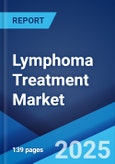Lymphoma Treatment Market Trends:
Rising Prevalence of Lymphoma
The prevalence of lymphoma, including both Hodgkin and non-Hodgkin lymphoma, is rising globally due to factors like aging populations and improved diagnostic capabilities. For instance, according to the American Cancer Society, nearly 80,000 people will suffer from non-Hodgkin lymphoma in 2024. This further drives the demand for efficient treatment, further expected to propel the lymphoma treatment market in the coming years.Surging Focus on Personalized Medicine
The rising focus on personalized medicine is significantly driving growth in the lymphoma treatment market. For instance, the global precision medicine market size reached US$ 75.2 Billion in 2023. Looking forward, the publisher expects the market to reach US$ 168.3 Billion by 2032, exhibiting a growth rate (CAGR) of 9.1% during 2024-2032. Personalized medicine in lymphoma treatment involves tailoring therapies based on individual patient characteristics, including genetic, molecular, and immunological profiles. These factors further positively influence the lymphoma treatment market forecast.Increasing R&D Investments
Significant investments in R&D by pharmaceutical companies and research institutions drive the development of new and improved lymphoma treatments, expanding the market with innovative therapies. For instance, in November 2023, the Leukemia & Lymphoma Society (LLS), a private supporter of blood cancer research, granted $65 million in new awards to 78 research teams in seven countries. Moreover, ongoing clinical trials and research studies contribute to the advancement of treatment options and the introduction of novel therapies to the market, thereby boosting the lymphoma treatment market revenue.Global Lymphoma Treatment Industry Segmentation:
The publisher provides an analysis of the key trends in each segment of the global lymphoma treatment market report, along with forecasts at the global, regional, and country levels from 2025-2033. Our report has categorized the market based on type, test type, and drug.Breakup by Type:
- Hodgkin Lymphoma
- Non-Hodgkin Lymphoma
According to the lymphoma treatment market outlook, Hodgkin lymphoma comprises a smaller proportion of all lymphomas, accounting for approximately 10% of cases worldwide. Moreover, it is more prevalent in developed countries compared to developing regions. Moreover, non-Hodgkin lymphoma is more common than Hodgkin lymphoma, accounting for approximately 90% of all lymphoma cases globally. NHL incidence rates have been increasing over the past few decades.
Breakup by Test Type:
- Chemotherapy
- Radiation Therapy
- Immunotherapy
- Targeted Therapy
- Biologic Therapy
- Others
According to the lymphoma treatment market overview, chemotherapy involves the use of drugs to kill cancer cells or slow their growth. These drugs can be administered orally or intravenously and work by targeting rapidly dividing cells throughout the body. Moreover, radiation therapy uses high-energy beams to target and destroy cancer cells. It is often delivered externally (external beam radiation) or internally (brachytherapy). Apart from this, immunotherapy harnesses the power of the immune system to recognize and attack cancer cells. Key approaches include monoclonal antibodies and immune checkpoint inhibitors.
Breakup by Drug:
- Adcetris
- Rituxan
- Opdivo
- Imbruvica
- Keytruda
- Revlimid
- Others
Adcetris is primarily used for the treatment of Hodgkin lymphoma (HL) and certain types of non-Hodgkin lymphoma (NHL), such as systemic anaplastic large cell lymphoma (sALCL). Moreover, Rituxan is a monoclonal antibody targeting CD20 antigen primarily used in B-cell NHL and certain autoimmune diseases like rheumatoid arthritis. Apart from this, Opdivo is an immune checkpoint inhibitor targeting PD-1 receptor used in various cancers, including melanoma, lung cancer, and Hodgkin lymphoma.
Breakup by Region:
- North America
- United States
- Canada
- Asia-Pacific
- China
- Japan
- India
- South Korea
- Australia
- Indonesia
- Others
- Europe
- Germany
- France
- United Kingdom
- Italy
- Spain
- Russia
- Others
- Latin America
- Brazil
- Mexico
- Others
- Middle East and Africa
According to the lymphoma treatment market statistics, North America represents a significant portion of the global lymphoma treatment market owing to the higher prevalence of lymphoma, particularly non-Hodgkin lymphoma (NHL), due to factors like aging population and environmental exposures. Moreover, the increasing emphasis on genomic profiling and targeted therapies, is driving the market growth in Europe. Apart from this, the rising incidence of lymphoma in Asia Pacific, partly due to aging populations, urbanization, and changing lifestyles is supporting the industry's demand.
Competitive Landscape:
The market research report has provided a comprehensive analysis of the competitive landscape. Detailed profiles of all major market companies have also been provided. Some of the key players in the market include:
- Abbott Laboratories
- Bristol-Myers Squibb Company
- Eli Lilly and Company
- F. Hoffmann-La Roche Ltd.
- Johnson & Johnson Services, Inc.
- Merck & Co., Inc.
- Novartis International AG
- Spectrum Pharmaceuticals, Inc.
- Takeda Pharmaceutical Company Limited
- Teva Pharmaceutical Industries Ltd.
Key Questions Answered in This Report:
- How has the global lymphoma treatment market performed so far and how will it perform in the coming years?
- What has been the impact of COVID-19 on the global lymphoma treatment market?
- What are the key regional markets?
- What is the breakup of the market based on the type?
- What is the breakup of the market based on the test type?
- What is the breakup of the market based on the drug?
- What are the various stages in the value chain of the industry?
- What are the key driving factors and challenges in the industry?
- What is the structure of the global lymphoma treatment market and who are the key players?
- What is the degree of competition in the industry?
Table of Contents
Companies Mentioned
- Abbott Laboratories
- Bristol-Myers Squibb Company
- Eli Lilly and Company
- F. Hoffmann-La Roche Ltd.
- Johnson & Johnson Services Inc
- Merck & Co. Inc
- Novartis International AG
- Spectrum Pharmaceuticals Inc
- Takeda Pharmaceutical Company Limited
- Teva Pharmaceutical Industries Ltd.








